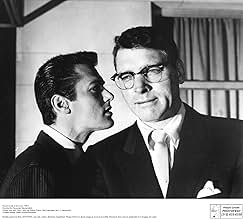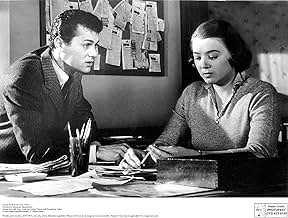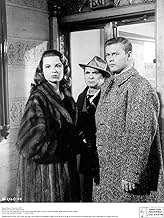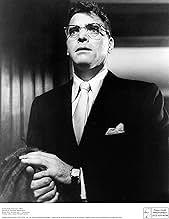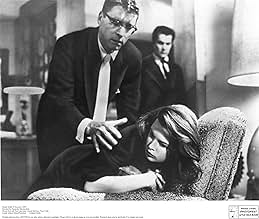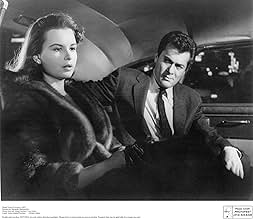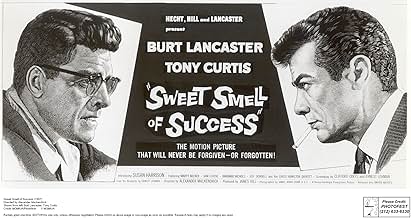NOTE IMDb
8,0/10
38 k
MA NOTE
Le chroniqueur puissant, mais contraire à l'éthique de Broadway J.J. Hunsecker contraint l'agent de presse sans scrupules Sidney Falco à rompre la romance de sa soeur avec un musicien de jaz... Tout lireLe chroniqueur puissant, mais contraire à l'éthique de Broadway J.J. Hunsecker contraint l'agent de presse sans scrupules Sidney Falco à rompre la romance de sa soeur avec un musicien de jazz.Le chroniqueur puissant, mais contraire à l'éthique de Broadway J.J. Hunsecker contraint l'agent de presse sans scrupules Sidney Falco à rompre la romance de sa soeur avec un musicien de jazz.
- Réalisation
- Scénario
- Casting principal
- Nomination aux 1 BAFTA Award
- 3 victoires et 3 nominations au total
Martin Milner
- Steve Dallas
- (as Marty Milner)
Chico Hamilton
- Self
- (as The Chico Hamilton Quintet)
Buddy Clark
- Self
- (as The Chico Hamilton Quintet)
Jay Adler
- Manny Davis
- (non crédité)
Mary Bayless
- Bar Patron
- (non crédité)
Nicky Blair
- Patron at Toots Shor's
- (non crédité)
Nick Borgani
- Waiter
- (non crédité)
Avis à la une
10twm-2
**MILD SPOILERS** It is amazing the number of different ways a great film can weave its alluring web and pull you into its story. Of my 100 favorite films, this one's journey into that rarefied status is unique, based on but a single viewing. I saw "Sweet Smell of Success" when I was too young to really grasp the subterranean motivations of the characters who so vividly populate the film. I did not understand, for instance, why this powerful, loathsome gossip columnist, Burt Lancaster's JJ Hunsecker, who so clearly despised Tony Curtis' Sidney Falco (press agent), nonetheless tolerated his presence. There was much that I DID appreciate--the brilliant and daring acting of the two leads, the beautifully oppressive cinematography, and the scintillating dialogue--but after that single viewing, the film slowly faded from my consciousness. Twenty-five or 30 years later, I decided to make a list of my favorite movies, and came across the title of this film. Apparently, memories of seeing this production had been roiling around my unconscious all this time and now, triggered by the little blurb in the Leonard Maltin book, these half-forgotten images came bounding back into mind, now concatenated with a quarter century of life and movie-going experience. Honing my list over the next few months, and considering this film's merits, I more and more began to realize what a truly marvelous work this was. This was a study nonpareil of two creatures wholly wrapped up in themselves and their ambition, yet bound together in a mutual parasitism (the term symbiosis sounds much too nice to describe their relationship). I understood, finally, why JJ tolerated Falco's presence. He NEEDED Falco. It wasn't just that Falco would occasionally offer up tidbits that he could use in his column. It wasn't that the fawning Falco could be manipulated into performing certain . . . Uh, tasks that were too dirty for JJ to touch. No, as a ruthless power-monger, he needed the treacherous sycophant as a constant reminder and test of his superiority. Falco could be demeaned and ridiculed, but he also represented a danger, a challenge. Falco might seem a toady, but he was also a cobra waiting his chance to strike, and Hunsecker relished his role as sadistic snake charmer. Watching these two play at their oppressive games of perfidy, and dealing dirt, provide a fascinating character study perhaps the equal of the more famous examination of one Charles Foster Kane in an earlier film. There are many other characters in the movie, such as JJ's sister and her lover, and some are played with great aplomb, but they are all pawns in this disdainful dance between JJ and Falco, and it is their personalities that stay with you long after the lights come back on.
Everything about this movie seems to be nearly perfect (some have criticised the film for the relatively weak portrayal of the two hapless lovers, but a stronger emphasis on these two would only detract from the real focus--JJ and Sidney) even to the choice of names. JJ Hunsecker and Sidney Falco seem perfect monikers, by themselves conjuring up images of loathsome characters. Unfortunately, for the team that put together this masterpiece of film-noir, "Sweet Smell of Success" was no success, and critics and movie-goers alike left the theaters convinced that the "smell" generated by the film was far from sweet. Amazingly, this film not only failed to garner an Oscar, it failed to receive a single solitary nomination--not for Alexander Mackendrick's direction (this abject failure truncating his promising career), not for the incisive, endlessly quotable screenplay (Ernest Lehman & Clifford Odets), not Elmer Bernstein's wonderful score, nor the tremendous performances of Curtis and Lancaster--not even James Wong Howe's gritty cinematography, beautifully capturing the seamier side of New York City. Fortunately, history has stepped in to provide a more accurate critique of this once ignored masterpiece. I can hardly wait to see it a second time.
Everything about this movie seems to be nearly perfect (some have criticised the film for the relatively weak portrayal of the two hapless lovers, but a stronger emphasis on these two would only detract from the real focus--JJ and Sidney) even to the choice of names. JJ Hunsecker and Sidney Falco seem perfect monikers, by themselves conjuring up images of loathsome characters. Unfortunately, for the team that put together this masterpiece of film-noir, "Sweet Smell of Success" was no success, and critics and movie-goers alike left the theaters convinced that the "smell" generated by the film was far from sweet. Amazingly, this film not only failed to garner an Oscar, it failed to receive a single solitary nomination--not for Alexander Mackendrick's direction (this abject failure truncating his promising career), not for the incisive, endlessly quotable screenplay (Ernest Lehman & Clifford Odets), not Elmer Bernstein's wonderful score, nor the tremendous performances of Curtis and Lancaster--not even James Wong Howe's gritty cinematography, beautifully capturing the seamier side of New York City. Fortunately, history has stepped in to provide a more accurate critique of this once ignored masterpiece. I can hardly wait to see it a second time.
The main characters in "Sweet Smell Of Success" are two of the most unpleasant, unprincipled and unsympathetic people imaginable. Both are utterly corrupt and would do whatever it takes to achieve their own perverse ends.
J J Hunsecker (Burt Lancaster) is a gossip columnist who wields enormous power in New York and has the ability to make or break the careers of anyone who features in his articles. He plies his vicious trade without any concern for those whose lives he damages and frequently influences people to do his bidding by threatening to expose some unflattering or scandalous information about them. Sidney Falco (Tony Curtis) is a press agent who makes his living by providing material for Hunsecker's column. When Hunsecker becomes unhappy about a relationship that has developed between his sister and a jazz guitarist, he orders Falco to do whatever's necessary to break them up. Hunsecker racks up the pressure on Falco by not accepting any of his contributions for the column until he succeeds in his mission.
Hunsecker's power and threatening manner preclude him from having any genuine or meaningful relationships with other people. He is unconcerned about this but has an unnaturally close relationship with his sister, who on various occasions, he describes as being all that he's got.
In his efforts to get a smear about the guitarist published, Falco threatens to blackmail one columnist by telling his wife about one of his indiscretions with a cigarette girl and also provides another columnist with an inducement to print the story by getting his girlfriend to prostitute herself. He later plants marijuana in the guitarist's pocket and tips off a corrupt police officer who has the guitarist arrested.
Hunsecker thrives on the amount of power and control that he is able to use and it's ironic that he has such a hard time using his power successfully in the area of his life which is most personal and important to him.
"Sweet Smell Of Success" is expertly directed by Alexander Mackendrick and the story and it's characters are considerably more original in nature than those found in the vast majority of movies. The dialogue is impressively incisive throughout and some of the remarks made by Hunsecker are delivered with great panache. When he says "I love this dirty town", the comment exemplifies what he's all about and also highlights the source of his power. His remarks that Falco is a "cookie full of arsenic" and "lives in moral twilight" are typical quick-fire put-downs. These and his "40 faces speech" could seem pretentious and contrived if uttered by some characters but sound perfectly credible when said by Hunsecker, who is clearly very literate and well practised in coining such bitter and brutal insults. Lancaster and Curtis both contribute exceptional performances which must rank among the greatest achieved in their illustrious careers.
J J Hunsecker (Burt Lancaster) is a gossip columnist who wields enormous power in New York and has the ability to make or break the careers of anyone who features in his articles. He plies his vicious trade without any concern for those whose lives he damages and frequently influences people to do his bidding by threatening to expose some unflattering or scandalous information about them. Sidney Falco (Tony Curtis) is a press agent who makes his living by providing material for Hunsecker's column. When Hunsecker becomes unhappy about a relationship that has developed between his sister and a jazz guitarist, he orders Falco to do whatever's necessary to break them up. Hunsecker racks up the pressure on Falco by not accepting any of his contributions for the column until he succeeds in his mission.
Hunsecker's power and threatening manner preclude him from having any genuine or meaningful relationships with other people. He is unconcerned about this but has an unnaturally close relationship with his sister, who on various occasions, he describes as being all that he's got.
In his efforts to get a smear about the guitarist published, Falco threatens to blackmail one columnist by telling his wife about one of his indiscretions with a cigarette girl and also provides another columnist with an inducement to print the story by getting his girlfriend to prostitute herself. He later plants marijuana in the guitarist's pocket and tips off a corrupt police officer who has the guitarist arrested.
Hunsecker thrives on the amount of power and control that he is able to use and it's ironic that he has such a hard time using his power successfully in the area of his life which is most personal and important to him.
"Sweet Smell Of Success" is expertly directed by Alexander Mackendrick and the story and it's characters are considerably more original in nature than those found in the vast majority of movies. The dialogue is impressively incisive throughout and some of the remarks made by Hunsecker are delivered with great panache. When he says "I love this dirty town", the comment exemplifies what he's all about and also highlights the source of his power. His remarks that Falco is a "cookie full of arsenic" and "lives in moral twilight" are typical quick-fire put-downs. These and his "40 faces speech" could seem pretentious and contrived if uttered by some characters but sound perfectly credible when said by Hunsecker, who is clearly very literate and well practised in coining such bitter and brutal insults. Lancaster and Curtis both contribute exceptional performances which must rank among the greatest achieved in their illustrious careers.
The fact that in 1957 this film was made at all is proof that Walter Winchell's decline was already setting in. Burt Lancaster's J.J. Hunsecker based on Winchell and very frightening accurately portrays the columnist and the power he wielded.
For those who are interested in how Winchell got to where he was J.J. Hunsecker I would recommend Neal Gabler's biography of him which came out a few years ago. Sweet Smell of Success is the story of a day in the life of this monster who everyone on the planet it seems is terrified of offending. Like Winchell at the Stork Club, Hunsecker holds court like some monarch at a nightclub where people are obsequiously asking for some recognition in his column.
One of these is Sidney Falco, press agent and bootlicking dog extraordinaire. Hunsecker is mad at him because he sent him on an errand to break up a romance his younger sister is having with a jazz musician he doesn't approve of. The film is essentially Falco's attempts to carry out his master's wishes.
Burt Lancaster had already received critical acclaim as an actor, but this was a breakthrough role for Tony Curtis as Sidney Falco. Up to then Curtis was the handsome romantic lead in many lightweight films for his home studio of Universal. Sidney Falco was a lot of things, but heroic wasn't one of them. Next year Tony Curtis would get an Oscar nomination for The Defiant Ones. How Lancaster and Curtis were ignored by the Academy for nominations is beyond me.
The young lovers are Susan Harrison and Martin Milner. This was probably Marty Milner's finest screen role. As Lancaster was also the producer he personally cast Milner in the part having worked with him on Gunfight at the OK Corral. Susan Harrison strangely enough never had much of a career after a promising debut. She ultimately wreaks a terrible vengeance on one of our protagonists.
One of the ironic lines in the film is Lancaster saying that he'd fold up if he had to exist on a press agent's tidbits. But ironically that's how Winchell/Hunsecker did exist. Winchell had no real skill as a reporter as Gabler's biography pointed out. When the tidbits stopped, he dried up and blew away.
Sweet Smell of Success was a commercial flop, movie audiences did not take to the offbeat casting of the leads nor to the gritty realistic story. Today the film is a deserved classic.
For those who are interested in how Winchell got to where he was J.J. Hunsecker I would recommend Neal Gabler's biography of him which came out a few years ago. Sweet Smell of Success is the story of a day in the life of this monster who everyone on the planet it seems is terrified of offending. Like Winchell at the Stork Club, Hunsecker holds court like some monarch at a nightclub where people are obsequiously asking for some recognition in his column.
One of these is Sidney Falco, press agent and bootlicking dog extraordinaire. Hunsecker is mad at him because he sent him on an errand to break up a romance his younger sister is having with a jazz musician he doesn't approve of. The film is essentially Falco's attempts to carry out his master's wishes.
Burt Lancaster had already received critical acclaim as an actor, but this was a breakthrough role for Tony Curtis as Sidney Falco. Up to then Curtis was the handsome romantic lead in many lightweight films for his home studio of Universal. Sidney Falco was a lot of things, but heroic wasn't one of them. Next year Tony Curtis would get an Oscar nomination for The Defiant Ones. How Lancaster and Curtis were ignored by the Academy for nominations is beyond me.
The young lovers are Susan Harrison and Martin Milner. This was probably Marty Milner's finest screen role. As Lancaster was also the producer he personally cast Milner in the part having worked with him on Gunfight at the OK Corral. Susan Harrison strangely enough never had much of a career after a promising debut. She ultimately wreaks a terrible vengeance on one of our protagonists.
One of the ironic lines in the film is Lancaster saying that he'd fold up if he had to exist on a press agent's tidbits. But ironically that's how Winchell/Hunsecker did exist. Winchell had no real skill as a reporter as Gabler's biography pointed out. When the tidbits stopped, he dried up and blew away.
Sweet Smell of Success was a commercial flop, movie audiences did not take to the offbeat casting of the leads nor to the gritty realistic story. Today the film is a deserved classic.
Press freedom is one of the best thing in any democratic society but it may sometimes produce/bring lies used for the advantage of powerful groups and/or circles. That is why this film was called in some Latin American countries "A Damn Lie". The excellent plot shows how someone arrogant, selfish, good writing and talking as J.J. Hunsecker (Burt Lancaster) was able to use various factors in the society he did his work in order to destroy any enemy, any adversary or any person whom he did not like at all. An example was the boy friend of his sister Susan, a working young man, devoted to music and strongly in love with Susan, completely discredited by JJ. Certainly JJ was a kind of a sick man, unable to accept any reason from any other person. He was born to have adversaries and not friends. To do all his work JJ needed snakes (not persons) as Sidney Falco (Tony Curtis), who behaved worse than a reptile, always praising JJ although he in fact hated him and creating the intrigues whenever there were necessary. Very good film and probably a lesson, the acting was also excellent, particularly of Lancaster as a tough columnist JJ and Tony Curtis as a low ethic man.
BURT LANCASTER was at the height of his illustrious film career when he played J.J. Hunsecker, the Broadway gossip columnist who dipped his pen in poison to destroy careers. TONY CURTIS was a long way from the days when he was ridiculed for saying "Yonda is the castle of my fadder" in films like SON OF ALI BABA and THE BLACK SHIELD OF FALWORTH.
Here, Curtis is every bit up to the chore of playing the slavishly obedient but hateful publicity man who seems to be fawning over Lancaster, but really despises him. Two towering performances in a film with some of the sharpest exchanges of dialog ever heard.
The cruel side of show biz gets full and rich observation from screenwriter Clifford Odets from a novel by Ernest Lehman. The bright lights of Broadway play against the rainswept streets of Broadway and Times Square, a shadowy sort of film noir background for the brutal story being told.
The story abounds in quotable moments, such as when Lancaster tells Curtis, "You're a cookie full of arsenic." The jazz score background sets the appropriate mood for a story as cynical as this, and the twists and turns of the plot will keep you hooked until the uncertain ending. The main plot line has Lancaster opposed to his sister's suitor, a jazz musician (MARTIN MILNER) and his efforts to get this man out of his sister's life with the help of his obedient slave.
But mainly, this is a film worth savoring to watch the intense performances of Lancaster and Curtis. I doubt whether either of them has ever done better work. For Lancaster, it only cemented his reputation as a man already judged to be a fine actor in the right role. For Curtis, it made film critics take this "pretty boy from Brooklyn" seriously for the first time and was the first big milestone in his budding film career.
Here, Curtis is every bit up to the chore of playing the slavishly obedient but hateful publicity man who seems to be fawning over Lancaster, but really despises him. Two towering performances in a film with some of the sharpest exchanges of dialog ever heard.
The cruel side of show biz gets full and rich observation from screenwriter Clifford Odets from a novel by Ernest Lehman. The bright lights of Broadway play against the rainswept streets of Broadway and Times Square, a shadowy sort of film noir background for the brutal story being told.
The story abounds in quotable moments, such as when Lancaster tells Curtis, "You're a cookie full of arsenic." The jazz score background sets the appropriate mood for a story as cynical as this, and the twists and turns of the plot will keep you hooked until the uncertain ending. The main plot line has Lancaster opposed to his sister's suitor, a jazz musician (MARTIN MILNER) and his efforts to get this man out of his sister's life with the help of his obedient slave.
But mainly, this is a film worth savoring to watch the intense performances of Lancaster and Curtis. I doubt whether either of them has ever done better work. For Lancaster, it only cemented his reputation as a man already judged to be a fine actor in the right role. For Curtis, it made film critics take this "pretty boy from Brooklyn" seriously for the first time and was the first big milestone in his budding film career.
Le saviez-vous
- AnecdotesPublicity materials for the film noted cinematographer James Wong Howe spread a film of Vaseline on Lancaster's glasses to create a shine and make his stare more menacing.
- Gaffes(at around 2 mins) When Sidney peruses J.J. Hunsecker's 'The Eyes of Broadway' column on page 21 of the New York Globe newspaper, it can be seen that several of the paragraphs are repeated. Of the nine paragraphs visible, it can be seen that paragraph 7 is an exact copy of paragraph 2; 8 is a copy of 5, and 9 is a copy of 4.
- Citations
J.J. Hunsecker: I'd hate to take a bite outta you. You're a cookie full of arsenic.
- Crédits fousintroducing Susan Harrison
- ConnexionsFeatured in Mackendrick: The Man Who Walked Away (1986)
Meilleurs choix
Connectez-vous pour évaluer et suivre la liste de favoris afin de recevoir des recommandations personnalisées
- How long is Sweet Smell of Success?Alimenté par Alexa
Détails
- Date de sortie
- Pays d’origine
- Langues
- Aussi connu sous le nom de
- La mentira maldita
- Lieux de tournage
- Sociétés de production
- Voir plus de crédits d'entreprise sur IMDbPro
Box-office
- Budget
- 3 400 000 $US (estimé)
- Montant brut mondial
- 8 025 $US
- Durée1 heure 36 minutes
- Couleur
- Rapport de forme
- 1.66 : 1(original ratio)
Contribuer à cette page
Suggérer une modification ou ajouter du contenu manquant

Lacune principale
By what name was Le Grand Chantage (1957) officially released in India in Hindi?
Répondre

